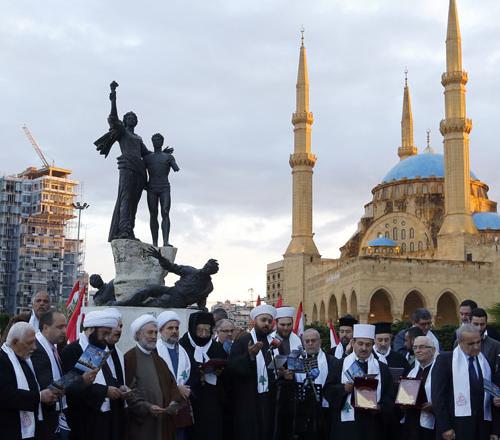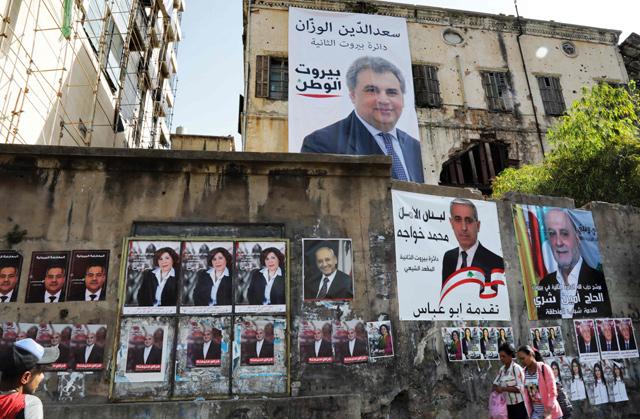You are here
One year on, still no president for Lebanon
By AFP - May 23,2015 - Last updated at May 23,2015
BEIRUT — Every few weeks for the past year, Lebanon's parliament has met, exchanged pleasantries, and made the same announcement: that it has again been unable to elect a president.
Pluralistic but divided Lebanon has now been without a head of state for 12 months, the longest time the post has been vacant since the devastating civil war ended in 1990.
But analysts say that regional conflicts, particularly the raging war in neighbouring Syria, make a presidential election in Lebanon unlikely in the near future.
"As long as the region is in constant turmoil, as we are experiencing now... Lebanon will have a difficult time agreeing on a president," said Imad Salamey, professor of political science at the Lebanese American University in Beirut.
Sahar Atrash, analyst at the International Crisis Group, told AFP that Lebanon, which is influenced heavily by regional powerhouses Iran and Saudi Arabia, "is not a priority" for now.
"Today, the regional sponsors are waging direct wars and proxy wars, and the regional issues are much bigger than meeting to elect a president for Lebanon," she said.
Since Michel Sleiman's term in office ended on May 25, 2014, parliament — which is responsible for electing the president — has failed 23 times to meet the two-thirds quorum required to hold an electoral session.
Since independence, Lebanon's leadership posts have been distributed among its largest religious sects: Sunni Muslims, Shiite Muslims and Christians, for whom the presidency is reserved.
With the onset of the Syrian regime's tutelage over Lebanon in 1990, the head of state — whose powers had largely been weakened — was elected with specific orders from Damascus.
Constant bickering
Today, the country's political class is split into two coalitions: March 8, which includes the powerful Shiite movement Hizbollah and supports the Syrian regime, and March 14, led by Sunni former premier Saad Hariri and bolstered by the West and Saudi Arabia.
The Christians — who make up 35 per cent of Lebanon's population — are divided evenly among the two groupings.
Since the withdrawal of Syrian troops in 2005, Lebanon's fractious political parties have been unable to organise regular and independent presidential elections.
In 2008, a seven-month presidential vacancy ended only after Qatar's intervention, which led the bickering parties to belatedly agree on Sleiman as head of state.
Analysts say increasing regional tensions make a similar arrangement unlikely today, however.
"Having a regional struggle that is sectarian-oriented does not help Lebanon reach a consensus among its three sectarian groups," Salamey said.
As conflicts between political rivals Saudi Arabia and Iran play themselves out in Iraq, Yemen and Syria, Lebanon's political class sits and waits, Atrash said.
Syria's war is the most divisive for Lebanon, which hosts more than 1 million Syrian refugees and regularly faces spillover violence from across the border.
That conflict has deepened sectarian faultlines between Lebanon's Sunnis and Shiites, "strengthening ties between sectarian groups and their sponsor states — the Sunnis with Saudi Arabia and Turkey, and the Shiites with Iran," Salamey said.
'What's the point?'
He believes that the only way to overcome the presidential impasse is "as part of a regional solution, particularly in Syria".
Lebanon's own politicians admit that their domestic politics are inextricably tied to foreign powers.
"We are ashamed to say that we haven't reached adulthood yet," said Dory Chamoun, an MP from March 14. "We still need foreign intervention for us to realise our duties."
Ayyub Hmayed, from the rival March 8 camp, told AFP: "Sadly, we have got used to having foreign powers with influence over us. It seems we are still waiting for this, while the foreign powers are busy elsewhere."
The deep political rifts that have prevented the election of a president have also hindered other state institutions.
In the absence of a head of state, presidential powers are constitutionally transferred to the Cabinet, but this is itself divided and struggling to operate.
Parliament is also so rife with discord that it has been unable to hold legislative sessions since Sleiman's term ended — except for a single vote to extend its own mandate.
"There are agreements with outside powers for over $1 billion that Lebanon is at risk of losing if parliament does not approve the funds," said parliamentary media official Mohammad Ballout.
But as the small country enters its second year without a head of state, the political paralysis that has left so many people disillusioned seems to have become accepted as normal.
"A president? What's the point? Nothing has changed in a year," Ala, a young student, told AFP wryly.
Related Articles
Lebanese paid their respects Saturday to the late former prime minister Rafiq Hariri, a decade after his assassination in a massive and shocking suicide bombing that destabilised the fragile country.
Several Lebanese leaders on Monday warned that the lessons of the country's civil war should not be forgotten, 40 years after the 15-year conflict began.
BEIRUT, Lebanon — As its first parliamentary vote in nearly a decade approaches, Lebanon has been swept into campaign fever: posters on ever
















